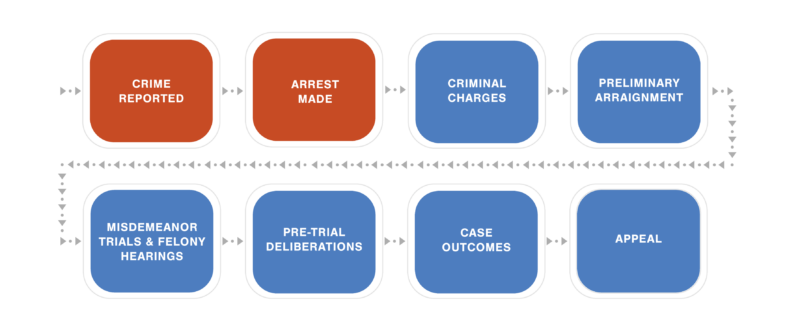
We are committed to making the system fair for all Philadelphians. Our job is to ensure the entire criminal justice process lives up to its ideals: that we always act in the best interest of our city, the safety and liberty of its citizens, and uphold the legacy of inalienable rights for which our city is known.

In most cases, a crime is either reported by the public or observed by a police officer. Crimes generally fall into two categories. Felonies, compared to misdemeanors, are more serious crimes that involve more serious consequences.
Arrests are made by the Philadelphia police. Officers can legally make a sight arrest without a warrant when they observe a crime, whether it’s a misdemeanor or felony offense, for example, during a vehicle stop or through surveillance. In most misdemeanor cases, if the police did not personally witness the offense, officers must secure an arrest warrant. But in felony cases, if police arrive and the alleged felony offender is still at the scene or found shortly after, officers can take them into custody and place them under arrest. To obtain an arrest warrant, an assigned detective will typically interview the victim and conduct an investigation. Once there is sufficient evidence, the detective will submit an affidavit of probable cause to the District Attorney’s Charging Unit. Once approved by prosecutors, the detective presents an arrest warrant and the affidavit to a judicial magistrate for approval. Only then can the police physically apprehend the accused.
The District Attorney’s Charging Unit—which operates 24 hours a day, seven days a week, 365 days a year—promptly reviews all sight arrests and arrest warrants to determine criminal charges against the defendant, either as an adult or as a juvenile. Attorneys ensure cases are supported by probable cause and all reasonable investigatory steps prior to drafting a criminal complaint, which lists charges and summarizes the factual basis for the charges. Prosecutors may also refer cases to the District Attorney Office’s Diversion Unit for alternatives to prosecution and incarceration based on the nature of the crime and the defendant’s eligibility. Diversion cases follow a different process.
Within hours of an arrest, a bail commissioner presides over a preliminary arraignment, advising the defendant of the charges in the criminal complaint, informing them of their right to a lawyer, and scheduling a preliminary hearing date for felonies or a trial date for misdemeanors. The bail commissioner also addresses bail conditions. If not released on their own recognizance, the commissioner sets a monetary amount that the defendant must post. The Office of the District Attorney continues to work on reforming Philadelphia’s cash bail system to eliminate requiring cash bail for nonviolent offenders.
Municipal Court handles misdemeanor trials and preliminary hearings for felony charges. For misdemeanor charges, the case remains in Municipal Court for trial. Preliminary hearings for felony charges also take place in Municipal Court. Cases that involve both felony and misdemeanor charges can remain in Municipal Court depending on the seriousness of each type of charge. Others go to the Court of Common Pleas for trial or other disposition. At this time, cases can still be referred to our Diversion Unit, which offers alternatives to prosecution and incarceration for eligible defendants.
Jury and waiver trials in felony cases take place in the Court of Common Pleas. There, case outcomes can be acquittal, supervision or incarceration. In most major-level cases, sentencing usually takes place within three months.
If the defendant is found guilty, a probation officer will prepare a Presentence Investigation Report by interviewing the defendant and possibly others who know the defendant. The trial judge can also order a mental health evaluation.
Victims who were harmed by a defendant’s conduct have a right to be heard by testifying during the sentencing hearing or submitting an impact statement in writing.
The judge will calculate and order restitution for all appropriate out-of-pocket costs incurred by the victim, including reimbursement for medical costs and property damage
If a defendant is found guilty at trial, they may have grounds to appeal their case to a higher court. Successful appeals are not common and can take years to resolve when they are. When they are successful, there’s generally a finding of a fundamental issue with the way the original trial was managed.
Most often, the first step in the appeal process for people convicted of a felony in Common Pleas Court would be to file an appeal with the Pennsylvania Superior Court, and then on to the Pennsylvania Supreme Court, if necessary. However, if the grounds for appeal fall into certain categories, under the state’s Post Conviction Relief Act, those appeals are first heard in Common Pleas Court.
In both of these appeal tracks—along with any additional appeals in federal courts—attorneys from our Appeals Unit, also called the Law Division, represent the Commonwealth and the District Attorney’s Office